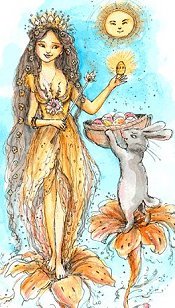 This was originally posted by me on April 4, 2006
This was originally posted by me on April 4, 2006Modern-day Easter is a blending of two traditions: one Judeo-Christian and the other Pagan. Both Christians and Pagans have death and resurrection themes on or after the Spring Equinox. Both Neopagans and Christians continue to celebrate religious rituals in the present day. Wiccans and other Neopagans hold their celebrations on the day or eve of the equinox. Christians wait until after the next full moon.
The Venerable Bede, (672-735 CE.) a Christian scholar, first asserted in his book De Ratione Temporum that Easter was named after Eostre (a.k.a. Eastre). She was the Great Mother Goddess of the Saxon people in Northern Europe. Similarly the Teutonic dawn goddess of fertility was known variously as Ostare, Ostara, Ostern, Eostra, Eostre, Eostur, Eastra, Eastur, Austron and Ausos." Her name was derived from the ancient word for spring: "eastre."
Many, perhaps most, Pagan religions in the Mediterranean area had a major seasonal day of religious celebration at or following the Spring Equinox. Around 200 B.C.E., mystery cults began to appear in Rome just as they had earlier in Greece. Most notable was the Cybele cult, centered on Vatican hill. Cybele was the Phrygian fertility goddess. Associated with the Cybele cult was worship of her lover, Attis (similar to the older demigods Tammuz, Osiris, Dionysus, and Orpheus). Attis was the god of ever-reviving vegetation. Born of a virgin, he died and was reborn annually. The spring festival March 22 to 25, began as a day of blood on Black Friday and culminated after three days in a day of rejoicing over the resurrection.
Christian worship of Jesus and Pagan worship of Attis were active in the same geographical area in ancient times, Christians "used to celebrate the death and resurrection of Jesus on the same date; and pagans and Christians used to quarrel bitterly about which of their gods was the true prototype and which the imitation." Many religious historians believe that the death and resurrection legends were first associated with Attis, many centuries before the birth of Jesus. They were simply grafted onto stories of Jesus' life in order to make Christian theology more acceptable to Pagans. Ancient Christians had an alternate explanation: they claimed that Satan had created counterfeit deities in advance of the coming of Christ in order to confuse humanity.
For more information see: www.religioustolerance.org/easter.htm







8 comments:
I see a resemblance there to the Mesopotamian goddess Ishtar.
Stardust:
You should read American Gods, by Neil Gaiman. Great book.
It was exceedingly common for xtianity to syncretize/borrow from other religions. Especially in Ireland, British Isles, etc. St. Brigid, for instance, was a nature deity. The Sluagh went from the 'unforgiven dead' to fallen angels (some changes were made, so the Sidhe and the Seelie/Unseelie court became fallen angels).
Ancient Christians had an alternate explanation: they claimed that Satan had created counterfeit deities in advance of the coming of Christ in order to confuse humanity.
Wasn't that Justin Martyr?
And how did Satan know that Jesus was coming?
I was thinking about how in the Gospels it seemed like Jesus couldn't go anywhere without bumping into somebody who was possessed by demons. Well, if the demons were smart, they would not have possessed ANYBODY in Judea while Jesus was walking around. If you deprive Jesus of the opportunity to expel demons then he's just a wandering babbler.
Thus, I would ask Christians, if Satan knew that Jesus was coming, then why give him the free publicity?
tommy, that would be an excellent topic for a post right in time for the Easter week.
Well, if the demons were smart
Always been one of Satan's biggest complaints...stuck with a bunch of demontards. After they finished planting all those fossils (insert "idle hands" comment here) they started huffing the brimstone and got stupid. Demon's famous last words: "Hey, watch me possess this!".
This should only be read if you have already swallowed your drink.
Oh, and the female fertility cycle in non-human mammals is refered to as the "eostrus" cycle (British spelling). Anyone know if this ties in?
This should only be read if you have already swallowed your drink.
spirula, good thing you warned me! Those are too damn funny!
Oh, and the female fertility cycle in non-human mammals is refered to as the "eostrus" cycle (British spelling). Anyone know if this ties in?
Interesting little connection there. But fundies will just blow it off. They are in denial about Easter's pagan origins. Satan planted those ideas to confuse us.
Post a Comment